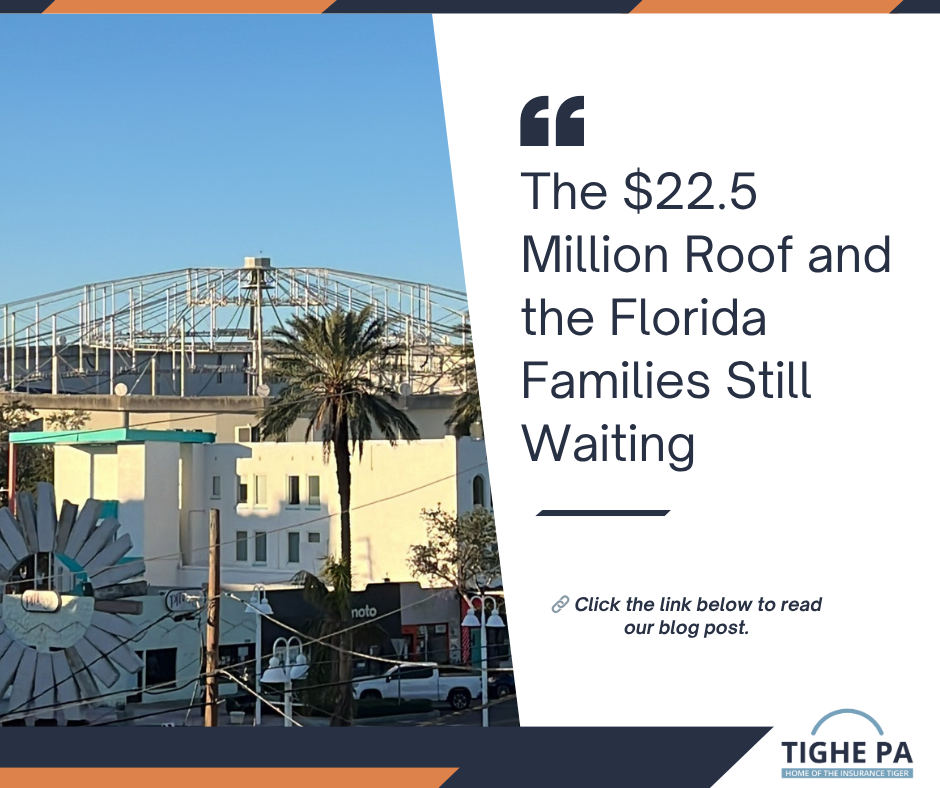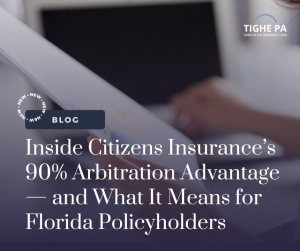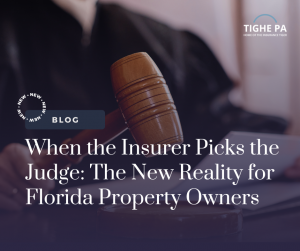When Disaster Hits, Who Gets Help First?
It’s been months since Hurricane Milton swept through Florida’s Gulf Coast, leaving behind collapsed roofs, destroyed infrastructure, and thousands of homeowners scrambling to recover. While the media coverage has died down, the damage remains. Many Floridians are still waiting for their insurance claims to be paid out—some haven’t even received a formal adjustment.
Yet amid this slow recovery, one storm-damaged structure is getting swift and decisive attention: Tropicana Field, the longtime home of the Tampa Bay Rays.
In early April, the St. Petersburg City Council voted 7–1 to allocate $22.5 million in taxpayer funds to replace the stadium’s hurricane-damaged roof. It was the first step in a larger $56 million plan to make the ballpark playable again by the 2026 season. The move was framed as a legal obligation under the city’s lease agreement with the team. But to many residents still waiting on basic repairs, it felt like a gut punch.
A Contractual Obligation—or a Political Calculation?
City officials were clear: the Rays’ lease requires them to fix the Trop. “We are legally bound by an agreement,” said Councilmember Lisset Hanewicz, who is also an attorney. “The agreement requires us to fix the stadium.”
That obligation includes repairing a custom roof that must be fabricated in Germany and assembled in China before it even arrives in Florida. Construction begins in August and will take about 10 months. Only then can work begin on the stadium’s interior, from flooring to concession stands.
Councilmember Richie Floyd was the only dissenting vote, urging the city to at least explore buying the Rays out of their lease as a more cost-effective option. But officials say the team has been unwilling to negotiate, leaving the city with few legal alternatives.
In the words of Councilmember Brandi Gabbard: “I’d much rather be spending that money on hurricane recovery and helping residents in the most affected neighborhoods. But these are the cards we’re dealt.”
A Tale of Two Timelines
That same week, the Florida Office of Insurance Regulation reported more than 238,000 property damage claims tied to Hurricane Milton. Billions in losses. Thousands of unpaid claims. Some closed without explanation. Many more stuck in what residents describe as an endless game of paperwork ping-pong.
“It’s hard to watch this play out and not notice the double standard,” said attorney Dan Tighe, founder of Tighe P.A., a law firm that represents policyholders in property damage disputes. “The city is moving heaven and earth to meet its obligation to a baseball stadium. Meanwhile, our clients—actual families—can’t get a response from their insurance company six months after the storm.”
In Sarasota, Venice, and Charlotte County—areas devastated by Hurricane Milton—nearly 30% of claims remain either unpaid or unresolved, according to state filings. Many families are still living in half-repaired homes or waiting on crucial appraisals.
The Hidden Crisis in Property Insurance
Hurricane Milton didn’t just expose structural weaknesses in Florida’s buildings—it laid bare the fragility of the state’s insurance system. Several insurers have gone bankrupt or pulled out of the market entirely. The companies that remain are tightening their belts, disputing claims more aggressively, and dragging out payments.
“The delays and denials aren’t random,” said Tighe. “They’re part of a calculated strategy—one that thrives when policyholders don’t have experienced legal representation.”
This storm also reminded many coastal homeowners—and condo associations—how vulnerable they are without proper coverage. In areas like Venice, Nokomis, and Sarasota, policies often exclude flood damage or limit windstorm protection. Others carry unusually high deductibles for named storms, meaning policyholders may be on the hook for tens of thousands before coverage even kicks in.
And for those with percentage-based hurricane deductibles tied to their home’s insured value, even minor repairs can exceed what families budgeted for recovery. A $500,000 home with a 5% hurricane deductible could leave the homeowner responsible for $25,000 out-of-pocket.
Without a strong understanding of what’s covered, what’s excluded, and how deductibles are triggered, even policyholders who thought they were prepared can find themselves underinsured when it matters most.
What This Says About Our Priorities
City leaders defended the Tropicana Field decision as a necessary legal move. They were quick to stress that failing to act could open the city up to lawsuits or even greater financial losses. Architect Raul Quintana warned that new international tariffs might raise the project’s cost even further, but said officials had no choice but to move ahead.
It’s a reminder that, when powerful entities are involved, the gears of recovery turn fast.
“The government is showing what it can do when it chooses to act,” said Tighe. “That’s what makes this so frustrating for everyday homeowners. The resources exist. The processes exist. But the willpower seems to evaporate when the person asking for help isn’t a corporation.”
It Shouldn’t Take a Stadium Contract to Get Action
There’s no doubt that Tropicana Field will get a new roof. That’s guaranteed. But for thousands of families impacted by Hurricane Milton, nothing is guaranteed—not even a fair process.
This moment offers a sobering look at Florida’s post-disaster priorities. Legal contracts are honored swiftly. Individual policyholders? Not so much.
If your property damage claim is stalled, lowballed, or denied—don’t wait.
Contact Tighe P.A. today for help understanding your options, including your rights under the appraisal process. Our attorneys are here to guide you, advocate for you, and help you recover what you’re truly owed.
Relevant Resources and Citations
- Florida Office of Insurance Regulation – Hurricane Milton Claims Data (2025): Publicly reported property damage claims and payment status statewide.
- City of St. Petersburg Council Meeting Notes – April 2025: Official record of vote and quotes from council members.
- ESPN Coverage – Tropicana Field Damage and MLB Statements: Background on the Rays’ stadium situation and league commentary.
You May Also Like:
- After the Storm: How Mariner Sands and Stuart Homeowners Are Fighting for Fair Insurance Payouts
- Why You Shouldn’t Accept Your Insurance Company’s Partial Roof Repair When You Are Owed A Roof Replacement
- How Can I Afford to Replace My Damaged Roof (or Other Damaged Property)?
- What’s My Tile Roof Insurance Claim Worth?



